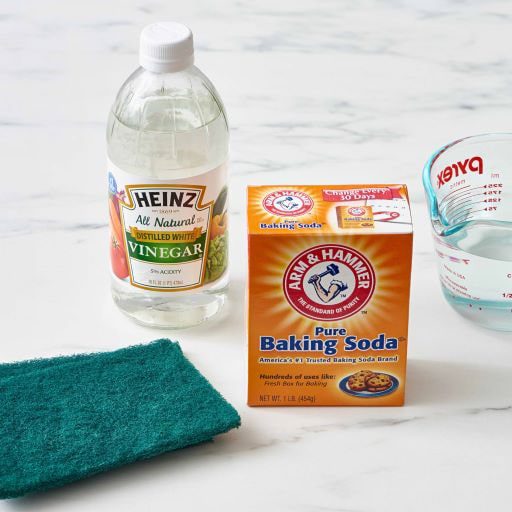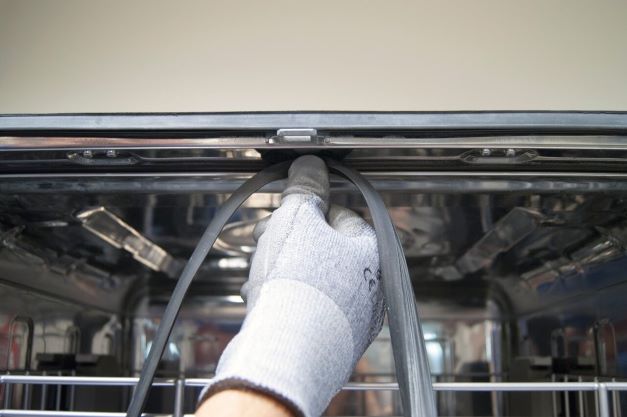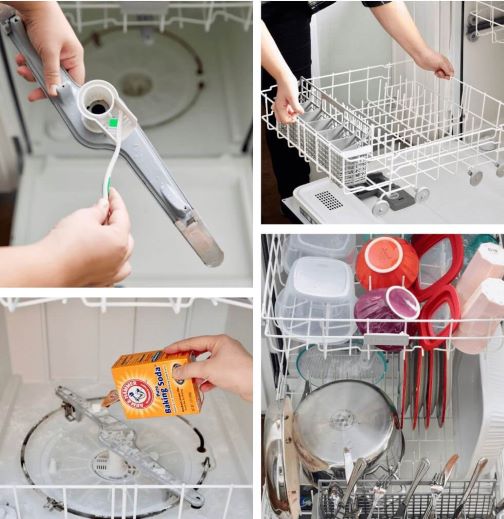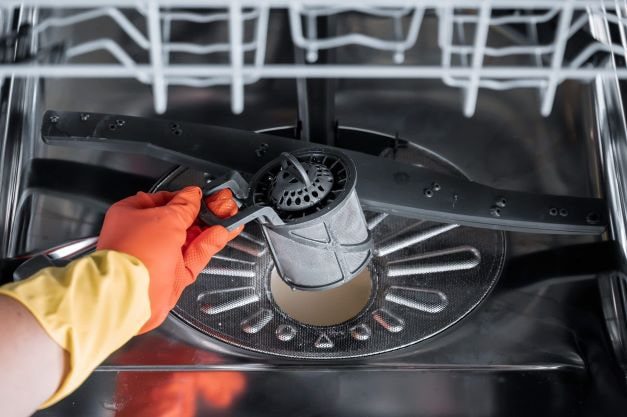It can be denied that the dishwasher is such an excellent facility for our houses.

It can be denied that the dishwasher is such an excellent facility for our houses. It helps many housewives with washing tableware which is one of the daily chores. Despite being a washer, the dishwasher smells bad and becomes dirty sometimes. Since the dishwasher often contacts food residue, mildew and germs won’t ignore this machine. There are some components of the dishwasher that you need to keep an eye on to maintain the cleanliness of the whole machine as well as avoid foul smells after use. Follow our instruction on How to deal with dishwasher smells bad to keep your dishwasher hygienic all the time.
Dishwasher odors can be a frustrating and unpleasant issue for many homeowners. These odors often stem from a variety of sources, including food residue, grease, and detergent buildup. When these substances accumulate inside your dishwasher, they create an ideal environment for bacteria to thrive, leading to those unwelcome smells. Understanding the root cause of the odor is crucial in resolving the issue and preventing future occurrences. By identifying the common causes of dishwasher odors, you can take the necessary steps to keep your appliance fresh and clean.
The unpleasant odor in your dishwasher can be attributed to the accumulation of food debris, grease, and detergent residue. When these substances are not properly cleaned and removed, they create a breeding ground for bacteria, which in turn leads to bad smells. Additionally, a clogged drain hose or sink drain can exacerbate the problem by preventing wastewater from properly draining away. Regular cleaning and maintenance of your dishwasher are essential to prevent the buildup of these substances and eliminate odors effectively.
The filter at the bottom of the dishwasher is designed to filter food residues. A dirty filter, clogged with accumulated food particles and debris, can lead to foul smells and poor cleaning performance. If it is not cleaned regularly, it will be a paradise for bacteria and mold. Rancid food particles gathered in the dishwasher filter/trap will generate the odor. This is the most common cause of a smelly dishwasher.
The drain line or drain hose of the dishwasher may cause odor if it is kinked or bent, leading to wastewater clogging. Besides, if the dishwasher drain hose is positioned too low, the wastewater may be unable to flow out but back into the bottom of the dishwasher.
Air gap is clogged/blocked and preventing the wastewater to be pumped out of the dishwasher.
Mold/bacteria can grow in the dishwasher if the machine is not run regularly.
Food has been dropped or a small animal may have crawled under the dishwasher.
Related: Why Does My Carpet Smell After Cleaning, And How To Get Rid Of The Smell Effectively
Identifying the source of the smell is crucial in resolving the issue. Start by checking your dishwasher’s drain filter and drain hose for any blockages or kinks that might be causing the problem. Inspect the dishwasher’s interior for any food residue or debris that could be contributing to the odor. If you notice any standing water in the dishwasher or under the sink, it may be a sign of a drainage issue. By pinpointing the source of the smell, you can take the necessary steps to resolve the issue and prevent future occurrences.
Resolving a bad smell in your dishwasher requires a combination of thorough cleaning and regular maintenance. Begin by running an empty wash cycle with a dishwasher-safe bowl filled with white vinegar placed on the top rack. This helps to remove grease and food particles that may be causing the odor. For a more intensive cleaning, consider using a commercial dishwasher cleaner, such as Finish. Additionally, make sure to clean the drain filter and drain hose to prevent blockages and odors. Regularly cleaning and maintaining your dishwasher will help prevent the buildup of substances that contribute to bad smells.
Preventing future smells in your dishwasher involves consistent cleaning and maintenance. Every 1-2 months, run a hot water cycle with a bowl of white vinegar to help remove grease and food particles. Regularly clean the drain filter and drain hose to prevent blockages that can lead to odors. Using a dishwasher cleaner, such as Lemishine, can also help keep your dishwasher clean and odor-free. By following these tips, you can prevent the buildup of substances that contribute to bad smells and ensure your dishwasher runs efficiently.
To have the best cleaning result, you should prepare some easy-to-find supplies:

Cleaning a dishwasher with vinegar and baking soda (Source: Internet)
Depending on how dirty is your washer you may choose to follow all the steps or skip unnecessary steps. Here are steps to clean every corner of your dishwasher:
Step 1: Remove any debris on the gasket
Dirt and filth tend to develop on the gasket surrounding the door frame, weakening the watertight seal of your dishwasher. Scrub the gasket lightly with an old toothbrush and a little white vinegar to remove any residue.

Step 2: Clean the door panel
A dirty dishwasher door won’t affect how the machine works. However, grease, food and fingerprints can build up quickly— especially on those high-touch areas, like the door handle. It’s gross to look at and it’s unsanitary, so you might as well give the door a deep clean while you’re at it.
Wipe off the inside and outside of the door panel with white vinegar and a clean dishtowel. Sprinkle a little baking soda on the region and gently scrape it with a soft bristle brush if you see any filth that simply won’t seem to move (this is generally a greater problem inside the dishwasher).
Step 3: Clean the sprayer arm
Food particles and debris can get lodged in the little holes of the dishwasher’s sprayer arm. Because dishwashers may be different in design and model, you can google how to clean your dishwasher by its name.
Once the sprayer arm has been removed, check the top and bottom for filth. To clean out the sprayer holes and remove anything nasty, use a toothbrush soaked in white vinegar. Then, replace the sprayer arm and return the bottom rack to the dishwasher.

Step 4: Clean the dishwasher filter and hose
In case there is any waste getting stuck on the filter or the hose, it may be the main cause of the smell. Check and remove any smell-causing factors that are left in the filter or the hose before cleaning. Also, be sure to check for the smell of burning plastic and ensure plastic items are not in contact with the heating element.
Soak up the filter and the hose with vinegar or baking soda solution for 10 – 15 minutes. Then scrub the filter with a toothbrush to remove all the waste. Rinse both the filter and the hose with water.

Step 5: Clean the drain
Food that’s too large to be flushed down the drain often gets stuck in the bottom of the dishwasher, resulting in a smelly mess. Start by removing the bottom rack and setting it aside. Next, feel around the bottom of the dishwasher looking for any food particles, trash or debris.
Step 6: Do a disinfecting wash
Because vinegar is effective at breaking down oil, soap scum, and residue, a hot vinegar wash will leave your dishwasher looking sparkling and fresh.
Fill a small bowl with 1 cup of white vinegar and set it upright in the center of the upper rack. Set your dishwasher to the hottest possible cycle.
Bonus: For extra salubrity, slide the bottom rack out and sprinkle a layer of baking soda over the bottom of the dishwasher. Do a second hot wash with just baking soda to remove stains and deodorise your machine.
Related: How To Clean Ninja Coffee Maker, How To Clean A Microwave, How To Deep Clean Kitchen Cabinets.
Daily cleaning may be the best option but it seems unnecessary, a weekly clean is fine. However, the filter where food waste is stored should be cleaned every day. Leaving food debris overnight will make your dishwasher smelly quickly after your deep cleaning.
Bleach is a powerful detergent that can be used widely in cleaning your house. However, it is an abrasive cleaner and pretty toxic so only use bleach once other kinds of cleaner such as vinegar and baking soda don’t work.
Dishwasher as well as any other kitchen appliances which contact food frequently should be cleaned on a regular basis to maintain cleanliness and hygiene. Therefore, no matter how busy you are, give them care unless you may have to deal with serious problems related to the quality of your food as well as your health.
Visit our website for helpful tips. Otherwise, simply order our specified Housing Cleaning Services to get all the work done perfectly. Sparkling and Beyond won’t let these household chores take your time anymore!
Feel free to contact us today! Our experienced cleaning experts are waiting for you!
If you want to check our availability and pricing, please check here
![]()